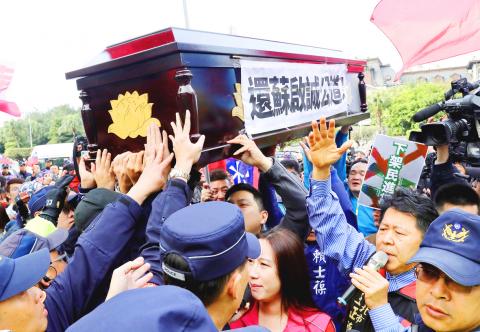Prosecutors should investigate whether an organization funded a Web manager who has been accused of running an “Internet army” to influence public opinion and allegedly posting an article that has been linked to the death of a diplomat, Taipei Mayor Ko Wen-je (柯文哲) said yesterday.
Yang Hui-ju (楊蕙如), who was a Web manager for then-Democratic Progressive Party (DPP) presidential candidate Frank Hsieh’s (謝長廷) campaign in 2008, allegedly has the same Internet protocol address as a man surnamed Tsai (蔡).
Typhoon Jebi hit Japan on Sept. 4 last year, forcing Kansai International Airport to shut down, stranding thousands of passengers.

Photo: CNA
A fabricated report spread online about the Chinese embassy in Japan having sent buses to evacuate Chinese from the airport, and some Internet users criticized the Taipei Economic and Cultural Office in Japan, which Hsieh heads as representative to Japan, for not helping Taiwanese.
Tsai allegedly posted an article on Sept. 6, defending Hsieh, and blaming the Osaka branch of the office, calling its officials “the remaining evil elements of the party-state.”
Then-branch director-general Su Chii-cherng (蘇啟誠) committed suicide at his residence eight days later. Media reports said his death might be linked with work pressure caused by public criticism.
The Taipei District Prosecutors’ office on Monday said that Yang had paid NT$10,000 (US$328) per month to Tsai and her other “Internet army” members to post articles and comments on news stories on popular social media platforms to influence public opinion.
Yang and Tsai have also been accused of insulting a public official.
Ko said that he does not believe that Yang paid her “Internet army” members herself and “there must be someone paying from above, so they should find out who is in the ‘upstream’ of the operation.”
When asked about speculation that the DPP had funded Yang, Ko said that every party has its own “Internet army,” adding that popular fan pages on social media platforms can be purchased.
“Everyone thinks earning money is important, but at the end it all comes down to citizens’ moral standards,” he said. “If vote-buying is still effective in Taiwan, then who can we blame for having bad presidents? It is just the reflection of the citizens’ level. Taiwan really needs a cultural reform movement.”
Ko on Monday night said on Facebook that he was not surprised that Taiwan’s Internet has been infiltrated by forces that want to affect elections.
“However, a Taiwanese party that claims to be ‘progressive’ has people using the same methods as mainland China, spending money on raising an Internet army to manipulate public opinion online and even possibly causing the death of a diplomat. It has been confirmed by prosecutors today,” he wrote. “I think anyone should condemn such operations.”
Yang was dubbed the “credit card goddess” after gaining fame in 2006 by generating more than NT$1 million profit in three months by using her credit cards.
Additional reporting by CNA

The CIA has a message for Chinese government officials worried about their place in Chinese President Xi Jinping’s (習近平) government: Come work with us. The agency released two Mandarin-language videos on social media on Thursday inviting disgruntled officials to contact the CIA. The recruitment videos posted on YouTube and X racked up more than 5 million views combined in their first day. The outreach comes as CIA Director John Ratcliffe has vowed to boost the agency’s use of intelligence from human sources and its focus on China, which has recently targeted US officials with its own espionage operations. The videos are “aimed at

STEADFAST FRIEND: The bills encourage increased Taiwan-US engagement and address China’s distortion of UN Resolution 2758 to isolate Taiwan internationally The Presidential Office yesterday thanked the US House of Representatives for unanimously passing two Taiwan-related bills highlighting its solid support for Taiwan’s democracy and global participation, and for deepening bilateral relations. One of the bills, the Taiwan Assurance Implementation Act, requires the US Department of State to periodically review its guidelines for engagement with Taiwan, and report to the US Congress on the guidelines and plans to lift self-imposed limitations on US-Taiwan engagement. The other bill is the Taiwan International Solidarity Act, which clarifies that UN Resolution 2758 does not address the issue of the representation of Taiwan or its people in

SHIFT: Taiwan’s better-than-expected first-quarter GDP and signs of weakness in the US have driven global capital back to emerging markets, the central bank head said The central bank yesterday blamed market speculation for the steep rise in the local currency, and urged exporters and financial institutions to stay calm and stop panic sell-offs to avoid hurting their own profitability. The nation’s top monetary policymaker said that it would step in, if necessary, to maintain order and stability in the foreign exchange market. The remarks came as the NT dollar yesterday closed up NT$0.919 to NT$30.145 against the US dollar in Taipei trading, after rising as high as NT$29.59 in intraday trading. The local currency has surged 5.85 percent against the greenback over the past two sessions, central

US Indo-Pacific Commander Admiral Samuel Paparo on Friday expressed concern over the rate at which China is diversifying its military exercises, the Financial Times (FT) reported on Saturday. “The rates of change on the depth and breadth of their exercises is the one non-linear effect that I’ve seen in the last year that wakes me up at night or keeps me up at night,” Paparo was quoted by FT as saying while attending the annual Sedona Forum at the McCain Institute in Arizona. Paparo also expressed concern over the speed with which China was expanding its military. While the US